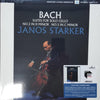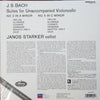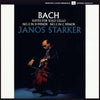









Bach - Suites for solo cello 2 & 5 - Janos Starker (Half-Speed Mastering)
Johann Sebastian Bach - Suites for solo cello No. 2 in A Minor & No. 5 in C Minor
Janos Starker - cello
1 LP, Standard sleeve
Original analog Master tape : YES
Half-speed mastering
Heavy Press : 180g
Record color : black
Speed : 33 RPM
Size : 12'’
Stereo
Studio
Record Press : unspecified
Label : Mercury Living Presence
Original Label : Mercury
Recording: April 1963, September and December 1965 at ballroom Studio A at Fine Recording Studios, New York
Engineered by Clarence Robert Fine and Robert Eberenz
Produced by Harold Lawrence
HD Transfers Made at Abbey Road Studios from the Original First-Generation Tapes
Tape-to-disc transfer by George Piros
New 3-to-2 Stereo Mixes Produced by Thomas Fine
Mastered at Abbey Road Studios
Sleeve Notes by Janos Starker
Originally released in 1957
Reissued in 2022
Tracks :
Side A: No. 2 in A Minor
- Prelude
- Allemande
- Courante
- Sarabande
- Menuets I and II
- Gigue
Side B: No. 5 in C Mnior
- Prelude
- Allemande
- Courante
- Sarabande
- Gavottes I and II
- Gigue
Reviews :
Long hailed as the audiophile's label, Mercury Living Presence represents an important milestone in the history of classical recording. Since they were first released, Mercury Living Presence LP records have been collected and coveted. 70 years after the label's first release - Mussorgsky's Pictures at an Exhibition, with Rafael Kubelík conducting the Chicago Symphony Orchestra - Mercury continues to be admired for the quality of its artistry and recordings: all celebrated for their sheer vividness of sound. This audiophile series sources the original first-generation master tapes. New HD transfers were made at Abbey Road Studios. Master files, including new 3-to-2 mixes for stereo titles, were produced by Thomas Fine, son of the original producer and recording engineer for the majority of Mercury Living Presence titles.
Originally released in 1964, this first LP of Starker's legendary Bach Suites recordings for Mercury met immediate acclaim and encouraged Starker and the recording team to wax the other four Suites. All six Suites were released together in a 1966 box set. Recorded April 15 and 17, 1963, in Fine Recording Ballroom Studio A, New York City, using three Schoeps M201 microphones.
Half-speed mastering.
In half-speed mastering, the whole process is slowed down to half of the original speed. A typical 33 1/3 rpm record is cut at 16 2/3 rpm. The source material is also slowed down (reducing the pitch in the process) meaning the final record will still sound normal when played back. Slowing the whole process down allows more time, which means the end result sounds better and is more efficient — allowing engineering to minimize the effects of inherent limitations within the vinyl format. The result is a more accurate and more open high-frequency response in the half speed vinyl when compared with a normal speed recording.
Rating:
Discogs : 4.67 / 5


